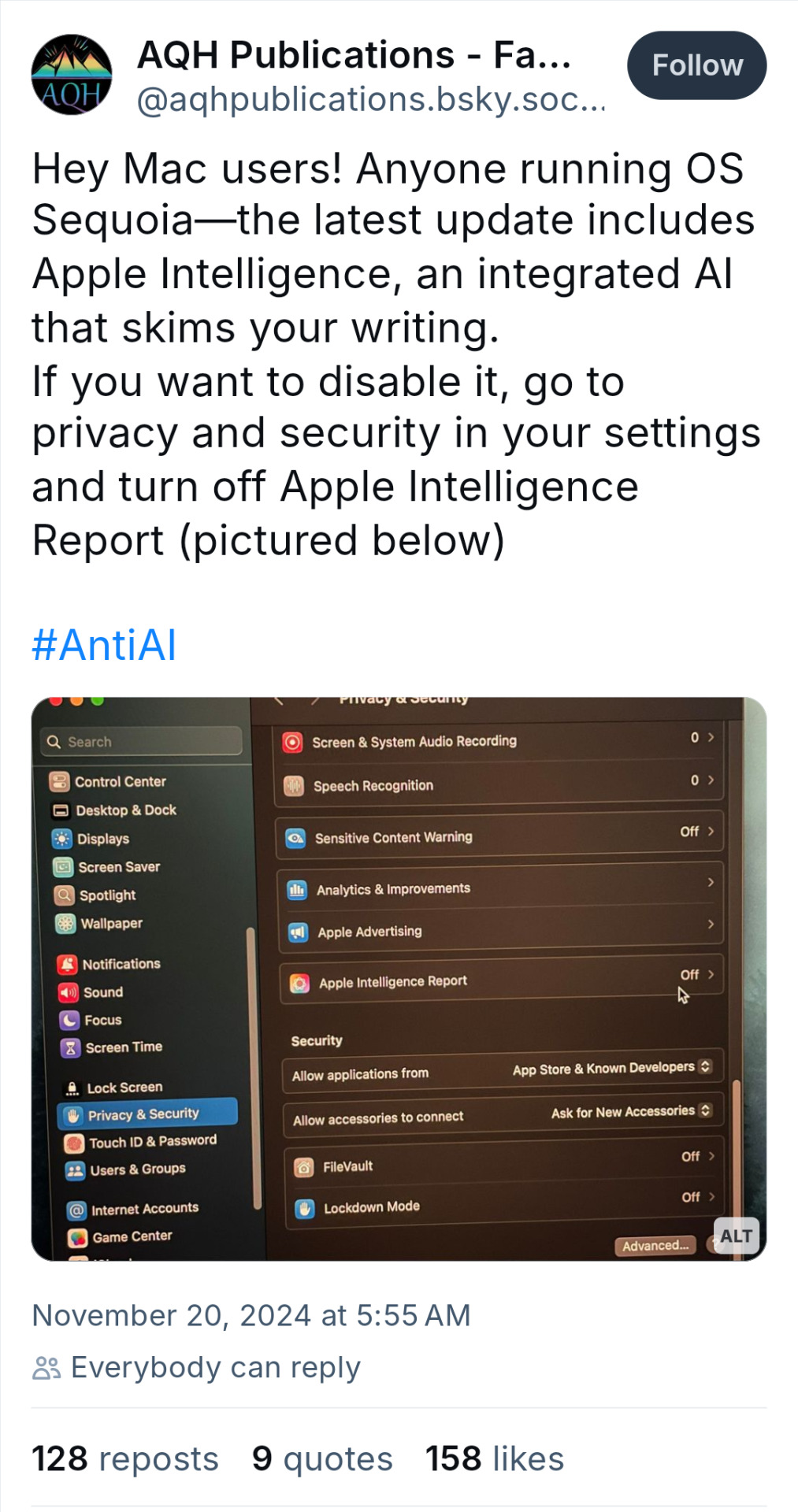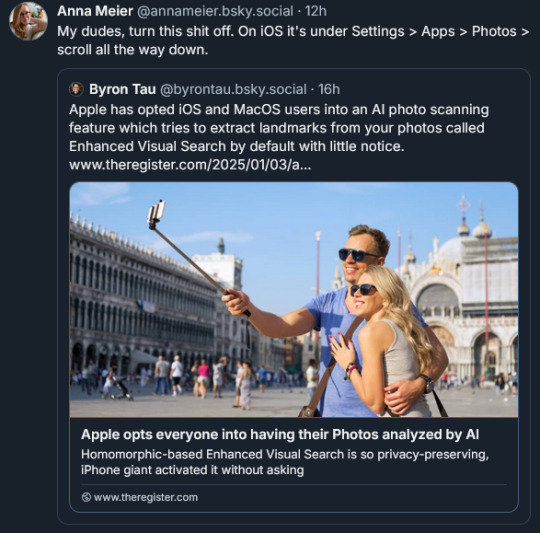#privacy and AI
Explore tagged Tumblr posts
Text
my little brother tried to show me a "cool trick" where he entered my name and hometown into chatgpt and tried to get it to pull up my personal info like it did on all of his friends, then was absolutely shocked when it couldn't find anything on me
so. keep practicing basic internet safety, guys. it still works. don't put your personal info on social media, keep all your accounts on private, turn off ai scraping on every site that you can, enable all privacy features on social media apps. our info still can be protected, we have to keep fighting for control
44K notes
·
View notes
Text
June 11 note - We’ve updated this post with even more tools!
Every day, there seem to be more reasons to break up with Google.

So we’ve rounded up a bunch of privacy-centric alternatives for all your deGoogling needs.
Check out the full list over on the blog!
- The Ellipsus Team xo
49K notes
·
View notes
Text

52K notes
·
View notes
Text
Is AI going to be the future of web browsing? - The Times of India
Representative image (Picture credit: NYT) When was the last time you thought about your web browser? If you don’t remember, no one will blame you. Web browsers have remained fundamentally unchanged for decades: You open an app, such as Chrome, Safari or Firefox, and type a website into the address bar, and off you go. A web browser is important because so much of what we do on computers takes…
#AI chatbot#AI web browsing#AI-powered web browser#Browser Company#ChatGPT integration#Comet browser#Dia browser#future of web browsers#Generative AI#privacy and AI
1 note
·
View note
Text
#AI Applications#AI Technology#Computer Vision#Ethical AI#facts#Future of AI#life#Machine Learning#Podcast#Privacy and AI#serious#straight forward#Surveillance Technology#truth#upfront#Visual Recognition#website
0 notes
Text
From instructions on how to opt out, look at the official staff post on the topic. It also gives more information on Tumblr's new policies. If you are opting out, remember to opt out each separate blog individually.
Please reblog this post, so it will get more votes!
#third party sharing#third-party sharing#scrapping#ai scrapping#Polls#tumblr#tumblr staff#poll#please reblog#art#everything else#features#opt out#policies#data privacy#privacy#please boost#staff
47K notes
·
View notes
Text
Integrating AI to Improve Politics: Opportunities and Challenges
Artificial Intelligence (AI) has the potential to revolutionize various aspects of politics, from enhancing decision-making processes to increasing transparency and engagement. Here are several ways AI can be integrated into politics to bring about improvements:
1. Data Analysis and Decision-Making
AI can analyze large volumes of data to identify trends, patterns, and correlations that human analysts might miss. By leveraging machine learning algorithms, policymakers can make more informed decisions based on empirical evidence and predictive models. For instance, AI can be used to predict the outcomes of different policy options, helping governments to choose the most effective strategies.
2. Enhancing Transparency and Accountability
AI can help increase government transparency and accountability by monitoring and analyzing public spending, detecting anomalies, and identifying potential cases of corruption or misuse of funds. By providing real-time insights into governmental activities, AI can enable citizens to hold their representatives accountable and ensure that public resources are used efficiently.
3. Improving Public Services
AI can streamline public services by automating routine tasks, optimizing resource allocation, and improving service delivery. For example, AI-powered chatbots can provide citizens with instant responses to their inquiries, while AI-driven systems can optimize healthcare, education, and transportation services to better meet the needs of the population.
4. Enhancing Public Engagement
AI can facilitate greater public engagement in the political process by analyzing social media and other online platforms to gauge public opinion, identify key issues, and predict voter behavior. This information can help politicians and policymakers to better understand the concerns of their constituents and to develop policies that reflect the needs and preferences of the public.
5. Combating Misinformation
AI can play a crucial role in identifying and combating misinformation and fake news. By using natural language processing (NLP) algorithms, AI can detect misleading content, verify facts, and provide users with accurate information. This can help to create a more informed electorate and reduce the impact of misinformation on political discourse.
6. Enhancing Security and Cyber Defense
AI can bolster national security and cyber defense by detecting and responding to cyber threats in real-time. Machine learning algorithms can identify unusual patterns of behavior that may indicate a cyber attack and can help to protect critical infrastructure and sensitive data from being compromised.
7. Facilitating International Diplomacy
AI can assist in international diplomacy by analyzing geopolitical trends, predicting potential conflicts, and identifying opportunities for cooperation. AI can also support negotiations by providing real-time translation services, summarizing key points, and identifying areas of agreement and disagreement.
Challenges and Ethical Considerations
While AI has the potential to improve politics in numerous ways, there are also significant challenges and ethical considerations to address:
Bias and Fairness: AI systems can perpetuate or even exacerbate existing biases if they are trained on biased data. Ensuring that AI is fair and unbiased is crucial to its successful integration into politics.
Privacy: The use of AI in politics raises important questions about privacy and data security. Safeguarding citizens' personal information and ensuring that data is used responsibly is essential.
Accountability: Determining accountability for decisions made or influenced by AI can be complex. Establishing clear guidelines and regulations for the use of AI in politics is necessary to ensure transparency and accountability.
Public Trust: Building and maintaining public trust in AI-driven political processes is critical. Governments and political entities must be transparent about how AI is used and must demonstrate its benefits to gain public support.
The integration of AI into politics offers significant opportunities for enhancing decision-making, transparency, public engagement, and security. However, it also presents challenges that must be carefully managed to ensure that AI is used ethically and responsibly. By addressing these challenges, AI can become a powerful tool for improving political processes and outcomes, ultimately leading to better governance and a more informed and engaged citizenry.
#philosophy#epistemology#knowledge#learning#education#chatgpt#politics#AI in Politics#Political Innovation#Government Transparency#Public Engagement#Decision-Making#Data Analysis#Combating Misinformation#Cybersecurity#Ethical AI#Privacy and AI
0 notes
Text
Amazon annihilates Alexa privacy settings, turns on continuous, nonconsensual audio uploading

I'm on a 20+ city book tour for my new novel PICKS AND SHOVELS. Catch me in SAN DIEGO at MYSTERIOUS GALAXY on Mar 24, and in CHICAGO with PETER SAGAL on Apr 2. More tour dates here.

Even by Amazon standards, this is extraordinarily sleazy: starting March 28, each Amazon Echo device will cease processing audio on-device and instead upload all the audio it captures to Amazon's cloud for processing, even if you have previously opted out of cloud-based processing:
https://arstechnica.com/gadgets/2025/03/everything-you-say-to-your-echo-will-be-sent-to-amazon-starting-on-march-28/
It's easy to flap your hands at this bit of thievery and say, "surveillance capitalists gonna surveillance capitalism," which would confine this fuckery to the realm of ideology (that is, "Amazon is ripping you off because they have bad ideas"). But that would be wrong. What's going on here is a material phenomenon, grounded in specific policy choices and by unpacking the material basis for this absolutely unforgivable move, we can understand how we got here – and where we should go next.
Start with Amazon's excuse for destroying your privacy: they want to do AI processing on the audio Alexa captures, and that is too computationally intensive for on-device processing. But that only raises another question: why does Amazon want to do this AI processing, even for customers who are happy with their Echo as-is, at the risk of infuriating and alienating millions of customers?
For Big Tech companies, AI is part of a "growth story" – a narrative about how these companies that have already saturated their markets will still continue to grow. It's hard to overstate how dominant Amazon is: they are the leading cloud provider, the most important retailer, and the majority of US households already subscribe to Prime. This may sound like a good place to be, but for Amazon, it's actually very dangerous.
Amazon has a sky-high price/earnings ratio – about triple the ratio of other retailers, like Target. That scorching P/E ratio reflects a belief by investors that Amazon will continue growing. Companies with very high p/e ratios have an unbeatable advantage relative to mature competitors – they can buy things with their stock, rather than paying cash for them. If Amazon wants to hire a key person, or acquire a key company, it can pad its offer with its extremely high-value, growing stock. Being able to buy things with stock instead of money is a powerful advantage, because money is scarce and exogenous (Amazon must acquire money from someone else, like a customer), while new Amazon stock can be conjured into existence by typing zeroes into a spreadsheet:
https://pluralistic.net/2025/03/06/privacy-last/#exceptionally-american
But the downside here is that every growth stock eventually stops growing. For Amazon to double its US Prime subscriber base, it will have to establish a breeding program to produce tens of millions of new Americans, raising them to maturity, getting them gainful employment, and then getting them to sign up for Prime. Almost by definition, a dominant firm ceases to be a growing firm, and lives with the constant threat of a stock revaluation as investors belief in future growth crumbles and they punch the "sell" button, hoping to liquidate their now-overvalued stock ahead of everyone else.
For Big Tech companies, a growth story isn't an ideological commitment to cancer-like continuous expansion. It's a practical, material phenomenon, driven by the need to maintain investor confidence that there are still worlds for the company to conquer.
That's where "AI" comes in. The hype around AI serves an important material need for tech companies. By lumping an incoherent set of poorly understood technologies together into a hot buzzword, tech companies can bamboozle investors into thinking that there's plenty of growth in their future.
OK, so that's the material need that this asshole tactic satisfies. Next, let's look at the technical dimension of this rug-pull.
How is it possible for Amazon to modify your Echo after you bought it? After all, you own your Echo. It is your property. Every first year law student learns this 18th century definition of property, from Sir William Blackstone:
That sole and despotic dominion which one man claims and exercises over the external things of the world, in total exclusion of the right of any other individual in the universe.
If the Echo is your property, how come Amazon gets to break it? Because we passed a law that lets them. Section 1201 of 1998's Digital Millennium Copyright Act makes it a felony to "bypass an access control" for a copyrighted work:
https://pluralistic.net/2024/05/24/record-scratch/#autoenshittification
That means that once Amazon reaches over the air to stir up the guts of your Echo, no one is allowed to give you a tool that will let you get inside your Echo and change the software back. Sure, it's your property, but exercising sole and despotic dominion over it requires breaking the digital lock that controls access to the firmware, and that's a felony punishable by a five-year prison sentence and a $500,000 fine for a first offense.
The Echo is an internet-connected device that treats its owner as an adversary and is designed to facilitate over-the-air updates by the manufacturer that are adverse to the interests of the owner. Giving a manufacturer the power to downgrade a device after you've bought it, in a way you can't roll back or defend against is an invitation to run the playbook of the Darth Vader MBA, in which the manufacturer replies to your outraged squawks with "I am altering the deal. Pray I don't alter it any further":
https://pluralistic.net/2023/10/26/hit-with-a-brick/#graceful-failure
The ability to remotely, unilaterally alter how a device or service works is called "twiddling" and it is a key factor in enshittification. By "twiddling" the knobs and dials that control the prices, costs, search rankings, recommendations, and core features of products and services, tech firms can play a high-speed shell-game that shifts value away from customers and suppliers and toward the firm and its executives:
https://pluralistic.net/2023/02/19/twiddler/
But how can this be legal? You bought an Echo and explicitly went into its settings to disable remote monitoring of the sounds in your home, and now Amazon – without your permission, against your express wishes – is going to start sending recordings from inside your house to its offices. Isn't that against the law?
Well, you'd think so, but US consumer privacy law is unbelievably backwards. Congress hasn't passed a consumer privacy law since 1988, when the Video Privacy Protection Act banned video store clerks from disclosing which VHS cassettes you brought home. That is the last technological privacy threat that Congress has given any consideration to:
https://pluralistic.net/2023/12/06/privacy-first/#but-not-just-privacy
This privacy vacuum has been filled up with surveillance on an unimaginable scale. Scumbag data-brokers you've never heard of openly boast about having dossiers on 91% of adult internet users, detailing who we are, what we watch, what we read, who we live with, who we follow on social media, what we buy online and offline, where we buy, when we buy, and why we buy:
https://gizmodo.com/data-broker-brags-about-having-highly-detailed-personal-information-on-nearly-all-internet-users-2000575762
To a first approximation, every kind of privacy violation is legal, because the concentrated commercial surveillance industry spends millions lobbying against privacy laws, and those millions are a bargain, because they make billions off the data they harvest with impunity.
Regulatory capture is a function of monopoly. Highly concentrated sectors don't need to engage in "wasteful competition," which leaves them with gigantic profits to spend on lobbying, which is extraordinarily effective, because a sector that is dominated by a handful of firms can easily arrive at a common negotiating position and speak with one voice to the government:
https://pluralistic.net/2022/06/05/regulatory-capture/
Starting with the Carter administration, and accelerating through every subsequent administration except Biden's, America has adopted an explicitly pro-monopoly policy, called the "consumer welfare" antitrust theory. 40 years later, our economy is riddled with monopolies:
https://pluralistic.net/2024/01/17/monopolies-produce-billionaires/#inequality-corruption-climate-poverty-sweatshops
Every part of this Echo privacy massacre is downstream of that policy choice: "growth stock" narratives about AI, twiddling, DMCA 1201, the Darth Vader MBA, the end of legal privacy protections. These are material things, not ideological ones. They exist to make a very, very small number of people very, very rich.
Your Echo is your property, you paid for it. You paid for the product and you are still the product:
https://pluralistic.net/2022/11/14/luxury-surveillance/#liar-liar
Now, Amazon says that the recordings your Echo will send to its data-centers will be deleted as soon as it's been processed by the AI servers. Amazon's made these claims before, and they were lies. Amazon eventually had to admit that its employees and a menagerie of overseas contractors were secretly given millions of recordings to listen to and make notes on:
https://archive.is/TD90k
And sometimes, Amazon just sent these recordings to random people on the internet:
https://www.washingtonpost.com/technology/2018/12/20/amazon-alexa-user-receives-audio-recordings-stranger-through-human-error/
Fool me once, etc. I will bet you a testicle* that Amazon will eventually have to admit that the recordings it harvests to feed its AI are also being retained and listened to by employees, contractors, and, possibly, randos on the internet.
*Not one of mine

If you'd like an essay-formatted version of this post to read or share, here's a link to it on pluralistic.net, my surveillance-free, ad-free, tracker-free blog:
https://pluralistic.net/2025/03/15/altering-the-deal/#telescreen

Image: Stock Catalog/https://www.quotecatalog.com (modified) https://commons.wikimedia.org/wiki/File:Alexa_%2840770465691%29.jpg
Sam Howzit (modified) https://commons.wikimedia.org/wiki/File:SWC_6_-_Darth_Vader_Costume_(7865106344).jpg
CC BY 2.0 https://creativecommons.org/licenses/by/2.0/deed.en
#pluralistic#alexa#ai#voice assistants#darth vader mba#amazon#growth stocks#twiddling#privacy#privacy first#enshittification
4K notes
·
View notes
Text
UPDATE! REBLOG THIS VERSION!
#reaux speaks#zoom#terms of service#ai#artificial intelligence#privacy#safety#internet#end to end encryption#virtual#remote#black mirror#joan is awful#twitter#instagram#tiktok#meetings#therapy
23K notes
·
View notes
Text


And they ask me // Is it going good in the garden? // I say I'm lost but I beg no pardon
#sleep token#sleep token fanart#vessel#sleep token vessel#vessel sleep token#caramel#even in arcadia#man. fuck man. this song#i started this before the song was out bc the single's art is beautiful#and i wanted to draw vessel with the morningstar#but i had to take a day to myself before finishing this#caramel is such a gorgeous and heartbreaking song#when people demanded heavy music i bet they didn't mean it like this#listening to it feels like vessel just flipped open his diary and sung a few pages from it#i get vessel#i feel deeply for him#we live in a world where privacy is nonexistent#where kindness is less and less expected from strangers#where people harass and threaten others in online spaces#where the only goal is to consume more and more and more until there's nothing left#as someone who's gonna probably lose her job in a few years to ai and greed#i too know how does it feel to hate the thing you love doing the most (art)#but still love it the same#anyways sorry for all the rambling :::')
1K notes
·
View notes
Text


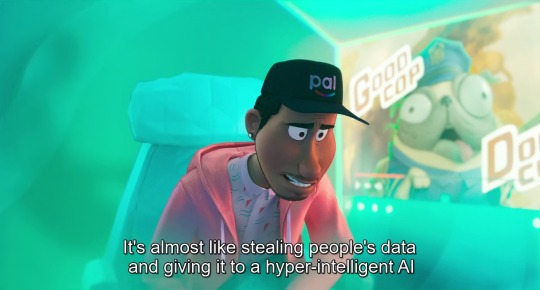



(from The Mitchells vs. the Machines, 2021)
#the mitchells vs the machines#data privacy#ai#artificial intelligence#digital privacy#genai#quote#problem solving#technology#sony pictures animation#sony animation#mike rianda#jeff rowe#danny mcbride#abbi jacobson#maya rudolph#internet privacy#internet safety#online privacy#technology entrepreneur
12K notes
·
View notes
Text

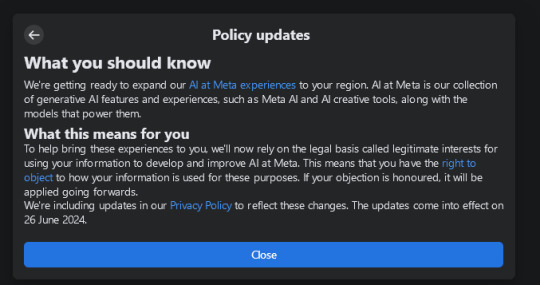
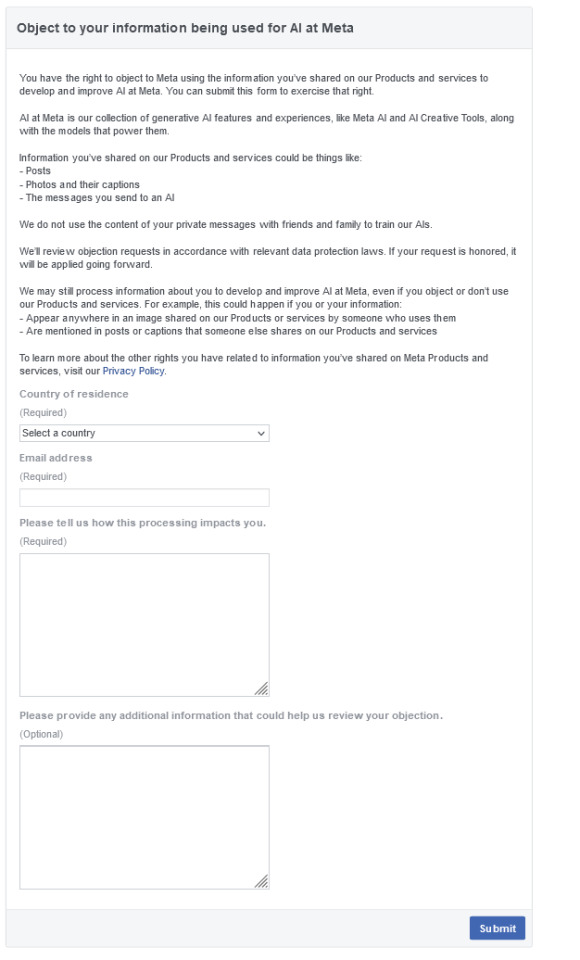
May 27, 2024 - Heads up if you are like me and still have a Facebook account you use infrequently: They're rolling out "AI features" for which they want to use all of your photographs, posts, likes and whatever. There's an opt out possibility at the "Right To Object" link. I don't know if this will work for Americans because you have no consumer protections, but I just filled in my EU country, said the processing impacts me because i'm an artist and my posts are my copyright and I'll sue them under EU law if they use them, and told them to go fuck themselves in the space for additional notes. After verifying my email I almost immediately got the response that my objection will be honored:
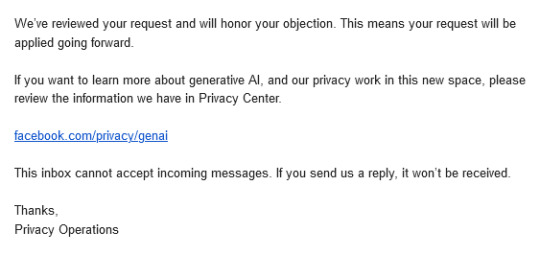
Now, this is Meta, so they are almost certainly lying about this, but for the future class action lawsuits against the company it's good to have officially opted out.
3K notes
·
View notes
Text
Are YOUR Digital Rights Under Attack? | GDPR Reform
youtube
Hey! I know we're all very busy looking at other places right now but this is kinda concerning
#advice on how to deal with this is welcomed#and don't tell me to get a vpn‚ that's a capitalist solution#eu#ai#dataprivacy#online privacy#european union#regulation loosening#slippery slope#YouTube#video#politics
248 notes
·
View notes
Text
Well i've drawn sexy things(Can find on my twitter😘) and now i'm back to angst again. Two things that go so well together💔
Uuuuuugh
#gravity falls#stanley pines#stanford pines#Also capcut is a bitch if you know about their new privacy or whatever it is#yep no privacy for us#AND they CAN steal your vid and make an ad outta it#AND if it got copyrighted WE are the one with the problem btw#fuckass app#so i went back to my first love#inshot#the ai is shit tho ugh
193 notes
·
View notes
